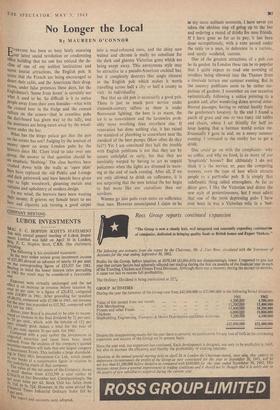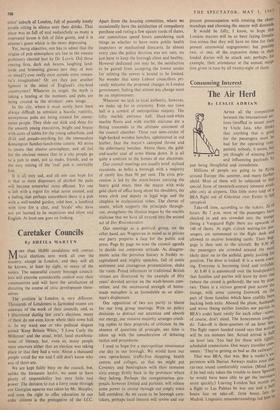No Longer the Local
By MAUREEN O'CONNOR EVERYONE has been so busy lately assessing our latest social revolution or condemning office building that no one has noticed the de- cline of one of our noblest institutions and surest tourist attractions, the English pub, It seems that the French are being encouraged to desert their cafes, and the Americans their drug- stores, under false pretences these days, for the Englishman's 'home from home' is certainly not what it used to be. So difficult is it to entice People away from their own firesides—what with the canned beer in the fridge and the canned culture on the screen—that in countless pubs the dart-board has given way to the telly, and the dominoes are being eaten away by the wood- worm under the bar. What has the bingo palace got that the pub on the corner has not? Judging by the amount of money spent on some London pubs by the brewers since Mr. Clore tried to take over one group, the answer to that question should be an emphatic 'Nothing.' The class barriers have Crashed down with the walls as 'open plan' bars have replaced the old Public and Lounge and dark paintwork and bare boards have, given Way to light woodwork, gleaming metals and curtains and upholstery of modern design. To my mind, the brewers have been wasting their money. It grieves my female heart to see beer and cigarette ash turning a good carpet into a mud-coloured mess, and the shiny new walnut and chrome is really no substitute for the dark and gloomy Victorian gems which are being swept away. This anonymous style may be attractive in a pseudo-American cocktail bar, but it completely destroys that single element in the English pub which makes it worth travelling across half a city or half a county to visit : its individuality.
Not that an old pub is necessarily a good pub. There is just as much poor service under sixteenth-century rafters as there is under fluorescent lighting; the beer is as warm, the ice is as non-existent and the lavatories prob- ably more revolting than anywhere else. If renovation has done nothing else, it has raised the standard of plumbing to somewhere near the standard of the beer pumps. (How often do they fail?) Yet I am convinced that half the trouble with English publicans is not that they are by nature unhelpful or surly, but that they are inevitably warped by having to act as -unpaid policemen when the lights are dimmed in warn- ing at the end of each evening. After all, if we are only allowed to drink on sufferance, it is not surprising that the men behind the bar begin to feel more like our custodians than our servitors.
Women go into pubs even more on sufferance than men. However emancipated I claim to be in my more militant moments, I have never yet taken the obvious step of going up to the bar and ordering a round of drinks for men friends. If I have gone so far as to pay, it has been done surreptitiously, with a note passed under the table to 'a man, in deference to a curious, and surely outdated, custom.
One of the greatest attractions of a pub can be its garden. In London these can be so popular that I quite expect to read one morning of revellers being elbowed into the Thames from a riverside terrace one summer evening. But in the country publicans seem to be rather sus- picious of gardens. I remember on one occasion optimistically following a notice pointing to a garden and, after wandering down several stone- floored passages, having to retreat hastily from the gentlemen's lavatory. In the end I found a patch of grass and one or two rusty old tables and chairs, where I sat thirstily for half an hour hoping that a barman would notice me. Eventually I gave in and, on a sunny summer evening, 1 retreated to the smoky bar to get a drink.
One could go on with the complaints : why no coffee, and why no food, in so many of our `hospitable' houses? But ultimately I do not think it is the service, or, pace the competing brewers, even the type of beer which attracts people to a particular pub. It is simply that indefinable thing called atmosphere. As far as decor goes, I like the Victorian and detest the new style of pretentiousness, but I must admit that one of the most depressing pubs I have ever been in was a Victorian relic in a 'bed- sitter' suburb of London, full of patently lonely people sitting in silence over their drinks. That place was as full of real melancholy as many a renovated house is full of false gaiety, and it is anyone's guess which is the more depressing.
Yet, being objective, one has to admit that the origins of pub atmosphere are lost in the roseate prehistory charted best by Dr. Leavis. Did those roaring fires, dark oak beams, laughing land- lords and brimming glasses (are they of beer or mead?) ever really exist outside some roman- tic's imagination? Or are they just another figment in the mind of England's city-bred countrymen? Whatever its origin, the myth is taking a beating at the moment, and pubs are being created in the drinkers' own image.
In the city, where it must surely have been always difficult to simulate a bucolic rusticity, anonymous pubs are being created for anony- mous people. They slide out slick and shiny for the smooth young executives, bright and brassy with acres of tables for the young suburbans, and ill-lit and pseudo-anything for the immaculate Kensington Sunday-lunch-time coterie. All strive to create that elusive atmosphere, and all fail for the obvious reason that in a city people go to a pub to meet, not to make, friends, and so the easy mixing of the 'real' pub is inevitably lost.
It is all very sad, and all one can hope for is that as mere dispensers of alcohol the pubs will become somewhat more efficient. Yet one is left with a regret for what never existed, and a feeling that perhaps somewhere there is a pub with a well-tended garden, cold beer, a landlord with time for a chat, and 'locals' who have not yet learned to be suspicious and silent and English. At least one goes on looking.







































 Previous page
Previous page